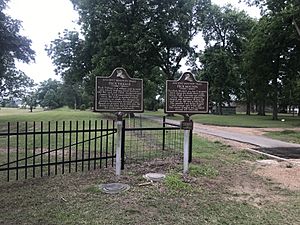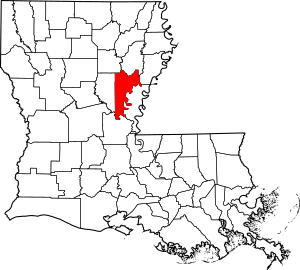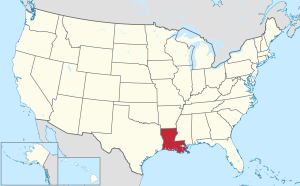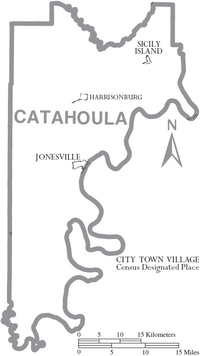Catahoula Parish, Louisiana facts for kids
Quick facts for kids
Catahoula Parish
|
|
|---|---|

Historic Marker Signs at Ferry Place and Peck Mounds.
|
|

Location within the U.S. state of Louisiana
|
|
 Louisiana's location within the U.S. |
|
| Country | |
| State | |
| Founded | March 23, 1808 |
| Named for | Tensas word for big, clear lake |
| Seat | Harrisonburg |
| Largest town | Jonesville |
| Area | |
| • Total | 739 sq mi (1,910 km2) |
| • Land | 708 sq mi (1,830 km2) |
| • Water | 31 sq mi (80 km2) 4.2% |
| Population
(2020)
|
|
| • Total | 8,906 |
| • Density | 12.051/sq mi (4.653/km2) |
| Time zone | UTC−6 (Central) |
| • Summer (DST) | UTC−5 (CDT) |
| Congressional district | 5th |
Catahoula Parish (French: Paroisse de Catahoula) is a parish in the U.S. state of Louisiana. A parish is like a county in other states. In 2020, about 8,906 people lived here. Its main town, called the parish seat, is Harrisonburg. This town is located on the Ouachita River. The parish was created in 1808. This was soon after the United States bought this land in the Louisiana Purchase of 1803.
Contents
Exploring the History of Catahoula Parish
Ancient Times: Native American Settlements
Long before Europeans arrived, many different Native American groups lived in Catahoula Parish. They lived here for thousands of years. These groups included the Marksville, Troyville, Coles Creek, and Plaquemine cultures. They built villages and large earth mounds all over the area.
Some important examples are Peck Mounds and the Troyville Earthworks. The Troyville Earthworks were built between 100 BCE and 700 CE.
One of the mounds here was once the tallest in Louisiana. It was 82 feet (25 meters) high. This made it the second-tallest mound in North America. Sadly, this huge mound was taken down. It was removed to build the Jonesville bridge over the Black River.
How Catahoula Parish Was Formed
Catahoula Parish was created in 1808. At first, it was a very large area. As more people moved in, new parishes were made from its land. For example, in 1910, La Salle Parish was formed from its western part.
Catahoula Parish has had many boundary changes. Only Natchitoches and Ouachita parishes have changed their borders more often.
After the Louisiana Purchase, many people moved here. Most came from the southern United States. They were mainly of British descent and Protestant. They brought new ideas and ways of life to Louisiana. Some also brought or bought enslaved African Americans. These enslaved people worked on large farms called plantations.
Several historic plantations are in the parish. These include Battleground Plantation, Ferry Place Plantation, and Marengo Plantation. Other important buildings are the Catahoula Parish Courthouse and Harrisonburg Methodist Church. The Sargent House and Spring Ridge Baptist Church are also listed as historic places.
The Famous Catahoula Dog Breed
Catahoula Parish is famous for its special dog breed. It's called the Catahoula Leopard dog. This dog is named after the parish!
Famous people have owned these dogs. Colonel James "Jim" Bowie and his brother Rezin Bowie owned them. Jim Bowie was a hero at the Battle of the Alamo. Later, in the early 1900s, President Theodore Roosevelt used Catahoula dogs for hunting. Louisiana Governor Earl Kemp Long also loved to collect these dogs.
Geography and Natural Features
Catahoula Parish covers about 739 square miles (1,914 square kilometers). Most of this area, 708 square miles (1,834 square kilometers), is land. The rest, about 31 square miles (80 square kilometers), is water. This means about 4.2% of the parish is water. Sandy Lake is a notable lake here.
Main Roads in the Parish
 US 84
US 84
 US 425 / LA 15
US 425 / LA 15 LA 8
LA 8 LA 28
LA 28 LA 124
LA 124 LA 126
LA 126
Neighboring Parishes
Catahoula Parish shares borders with several other parishes:
- Franklin Parish (north)
- Tensas Parish (northeast)
- Concordia Parish (east)
- Avoyelles Parish (south)
- La Salle Parish (west)
- Caldwell Parish (northwest)
Protected Natural Areas
Part of the Catahoula National Wildlife Refuge is located within the parish. This refuge helps protect wildlife and their habitats.
People and Population (Demographics)
| Historical population | |||
|---|---|---|---|
| Census | Pop. | %± | |
| 1820 | 2,287 | — | |
| 1830 | 2,581 | 12.9% | |
| 1840 | 4,955 | 92.0% | |
| 1850 | 7,132 | 43.9% | |
| 1860 | 11,651 | 63.4% | |
| 1870 | 8,475 | −27.3% | |
| 1880 | 10,277 | 21.3% | |
| 1890 | 12,002 | 16.8% | |
| 1900 | 16,351 | 36.2% | |
| 1910 | 10,415 | −36.3% | |
| 1920 | 11,074 | 6.3% | |
| 1930 | 12,451 | 12.4% | |
| 1940 | 14,618 | 17.4% | |
| 1950 | 11,834 | −19.0% | |
| 1960 | 11,421 | −3.5% | |
| 1970 | 11,769 | 3.0% | |
| 1980 | 12,287 | 4.4% | |
| 1990 | 11,065 | −9.9% | |
| 2000 | 10,920 | −1.3% | |
| 2010 | 10,407 | −4.7% | |
| 2020 | 8,906 | −14.4% | |
| U.S. Decennial Census 1790-1960 1900-1990 1990-2000 2010 |
|||
The population of Catahoula Parish has changed over the years. The table above shows how many people have lived here since 1820.
Who Lives in Catahoula Parish? (2020 Census)
The 2020 United States census counted 8,906 people living in the parish. There were 3,364 households and 2,421 families.
The table below shows the different groups of people living in Catahoula Parish in 2020:
| Race | Number | Percentage |
|---|---|---|
| White (non-Hispanic) | 5,738 | 64.43% |
| Black or African American (non-Hispanic) | 2,275 | 25.54% |
| Native American | 34 | 0.38% |
| Asian | 26 | 0.29% |
| Pacific Islander | 6 | 0.07% |
| Other/Mixed | 213 | 2.39% |
| Hispanic or Latino | 614 | 6.89% |
Education in Catahoula Parish
The Catahoula Parish School Board is in charge of the public schools in the area. They make sure students get a good education.
National Guard Presence
The 1087th Transportation Company is part of the National Guard. It is located in Jonesville, Louisiana. This company helps with transportation and support.
Towns and Communities
Catahoula Parish has one town and several villages and smaller communities.
Town
Villages
Unincorporated Areas
Census-designated place
Unincorporated communities
- Aimwell
- Enterprise
- Foules
- Larto
- Leland
- Manifest
- Sandy Lake
Notable People from Catahoula Parish
Many interesting people have come from Catahoula Parish:
- Ralph E. King: A doctor from Winnsboro. He served in the Louisiana State Senate for many years.
- Moses J. Liddell: He was appointed as a judge for the Supreme Court of the Montana Territory.
- St. John Richardson Liddell: A Confederate general during the American Civil War. He owned a large plantation in the parish.
- Sara T. Mayo: A doctor who also worked to help others.
- Joe Raymond Peace: A well-known football coach.
- William S. Peck, Sr.: A politician from the area.
- Chris Shivers: A two-time PBR World Champion bull rider (in 2000 and 2003).
Images for kids
See also
 In Spanish: Parroquia de Catahoula para niños
In Spanish: Parroquia de Catahoula para niños
 | Aaron Henry |
 | T. R. M. Howard |
 | Jesse Jackson |



